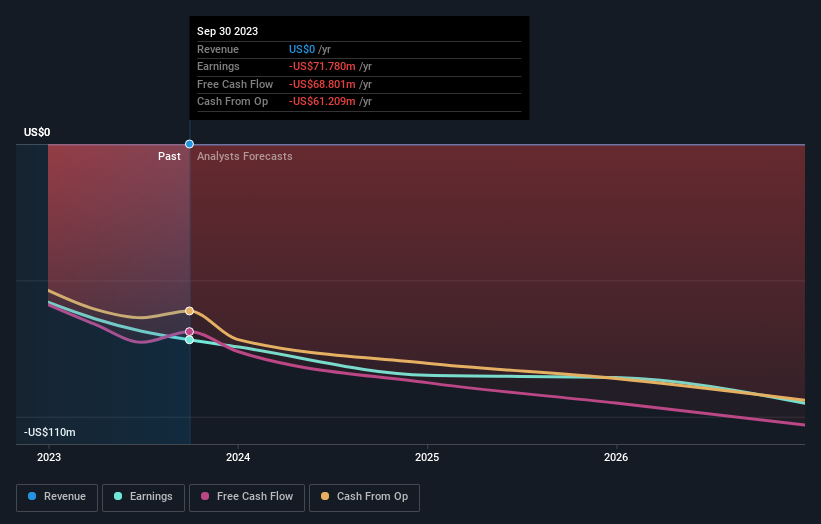Private equity firms are Korro Bio, Inc.'s (NASDAQ:KRRO) biggest owners and were rewarded after market cap rose by US$161m last week
Key Insights
The considerable ownership by private equity firms in Korro Bio indicates that they collectively have a greater say in management and business strategy
52% of the business is held by the top 5 shareholders
Every investor in Korro Bio, Inc. (NASDAQ:KRRO) should be aware of the most powerful shareholder groups. And the group that holds the biggest piece of the pie are private equity firms with 33% ownership. Put another way, the group faces the maximum upside potential (or downside risk).
Clearly, private equity firms benefitted the most after the company's market cap rose by US$161m last week.
Let's take a closer look to see what the different types of shareholders can tell us about Korro Bio.
See our latest analysis for Korro Bio
What Does The Institutional Ownership Tell Us About Korro Bio?
Institutional investors commonly compare their own returns to the returns of a commonly followed index. So they generally do consider buying larger companies that are included in the relevant benchmark index.
We can see that Korro Bio does have institutional investors; and they hold a good portion of the company's stock. This implies the analysts working for those institutions have looked at the stock and they like it. But just like anyone else, they could be wrong. When multiple institutions own a stock, there's always a risk that they are in a 'crowded trade'. When such a trade goes wrong, multiple parties may compete to sell stock fast. This risk is higher in a company without a history of growth. You can see Korro Bio's historic earnings and revenue below, but keep in mind there's always more to the story.
It looks like hedge funds own 22% of Korro Bio shares. That's interesting, because hedge funds can be quite active and activist. Many look for medium term catalysts that will drive the share price higher. Our data shows that Atlas Venture L.P. is the largest shareholder with 14% of shares outstanding. In comparison, the second and third largest shareholders hold about 13% and 9.1% of the stock.
Our research also brought to light the fact that roughly 52% of the company is controlled by the top 5 shareholders suggesting that these owners wield significant influence on the business.
While studying institutional ownership for a company can add value to your research, it is also a good practice to research analyst recommendations to get a deeper understand of a stock's expected performance. There are a reasonable number of analysts covering the stock, so it might be useful to find out their aggregate view on the future.
Insider Ownership Of Korro Bio
While the precise definition of an insider can be subjective, almost everyone considers board members to be insiders. Company management run the business, but the CEO will answer to the board, even if he or she is a member of it.
Most consider insider ownership a positive because it can indicate the board is well aligned with other shareholders. However, on some occasions too much power is concentrated within this group.
Shareholders would probably be interested to learn that insiders own shares in Korro Bio, Inc.. It has a market capitalization of just US$554m, and insiders have US$42m worth of shares, in their own names. Some would say this shows alignment of interests between shareholders and the board. But it might be worth checking if those insiders have been selling.
General Public Ownership
The general public, who are usually individual investors, hold a 18% stake in Korro Bio. This size of ownership, while considerable, may not be enough to change company policy if the decision is not in sync with other large shareholders.
Private Equity Ownership
With an ownership of 33%, private equity firms are in a position to play a role in shaping corporate strategy with a focus on value creation. Some might like this, because private equity are sometimes activists who hold management accountable. But other times, private equity is selling out, having taking the company public.
Next Steps:
I find it very interesting to look at who exactly owns a company. But to truly gain insight, we need to consider other information, too. Take risks for example - Korro Bio has 5 warning signs (and 3 which are significant) we think you should know about.
Ultimately the future is most important. You can access this free report on analyst forecasts for the company.
NB: Figures in this article are calculated using data from the last twelve months, which refer to the 12-month period ending on the last date of the month the financial statement is dated. This may not be consistent with full year annual report figures.
Have feedback on this article? Concerned about the content? Get in touch with us directly. Alternatively, email editorial-team (at) simplywallst.com.
This article by Simply Wall St is general in nature. We provide commentary based on historical data and analyst forecasts only using an unbiased methodology and our articles are not intended to be financial advice. It does not constitute a recommendation to buy or sell any stock, and does not take account of your objectives, or your financial situation. We aim to bring you long-term focused analysis driven by fundamental data. Note that our analysis may not factor in the latest price-sensitive company announcements or qualitative material. Simply Wall St has no position in any stocks mentioned.

 Yahoo Finance
Yahoo Finance 

